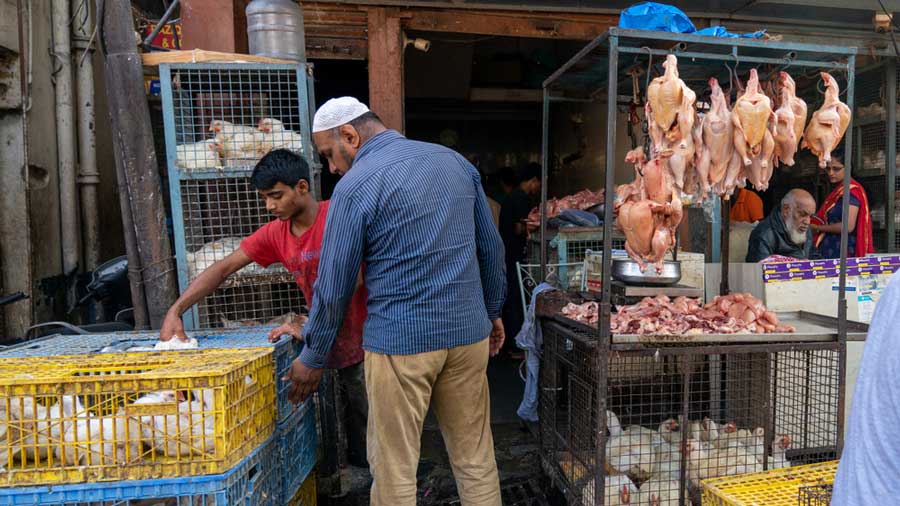Hindutva groups in parts of north India have been accused of forcing meat sellers to shut shop during Navratri, leaving the mostly impoverished traders with no source of income for nine days and too fearful of seeking redress in a communally charged atmosphere.
Many Hindus in the north abstain from non-vegetarian food during Navratri, which reduces demand for meat. But growing activism of Hindutva groups has led to the closure of meat shops, including those selling chicken, in several Hindi-speaking states every Navratri over the past decade or so.
There have been videos this year on social media of meat shops being picketed and sellers bullied.
In the National Capital Region, incidents of mob-led closure of shops have been reported from Haryana’s Gurgaon, Faridabad and Palwal, and Uttar Pradesh’s Gautam Buddha Nagar (Noida), Meerut and Sikandrabad.
Groups such as Gurgaon’s Sanyukt Hindu Sangharsh Samiti, factions of the Bajrang Dal, the Delhi-based Hindu Sena, the Hindu Mahasabha and the Hindu Jagran Manch have petitioned district administrations in the region to order the closure of shops and restaurants selling meat, poultry and fish during Navratri. In Sikandrabad, the police have ordered shops to close during the nine-day festivities. In most cases, sellers have preferred to shut shop rather than file FIRs.
Although no large-scale protests against non-vegetarian food have taken place in Delhi this year, meat sellers say they have been forced to close in parts of North and East Delhi.
Arshad Habib Qureshi, president of the Delhi Meat Merchants Association (DMMA), told The Telegraph: “Many people don’t eat meat during this time and some shops close for a few days. But even those who want to eat meat are unable to do so because many sellers are forced to shut by some groups and local residents, particularly over the last decade. Most sellers lead a hand-to-mouth existence and can’t afford to close for nine days. It affects our right to livelihood as well as the freedom of people to eat what they want. We want the government to take responsibility and initiate action.”
The DMMA represents the bulk of the approximately 6,000 meat sellers who have licences from any of Delhi’s five municipal bodies — three run by the BJP and two controlled by the Centre where the BJP is in power.
Qureshi said they had not complained to the police but were meeting municipal officials in areas where they face harassment.
“When there is communal tension, it is better to keep quiet and try to build better relations. That is the only way one can do business, especially in residential areas. Forced closure despite us complying with licence conditions is wrong,” he said.
Vegetarian activism in the name of Hinduism is not new to Delhi. In 1970, the Delhi Meat Control Bill of the Jan Sangh-led Delhi Municipal Council had sought to criminalise the slaughter, sale and consumption of buffalo meat during 70 Hindu festivals a year, said Nazima Parveen, the author of Contested Homelands: Politics of Space and Identity.
She explained: “Since the late 90s, (BJP MP) Maneka Gandhi’s NGO (People For Animals) has been stopping transporters for alleged violations of the Prevention of Cruelty to Animals Act, 1960. The seized animals are held by the police and released only if the seller or transporter is acquitted and pays a fee for maintenance of the animals during that time. Very often, the owners don’t claim the animals as they can’t afford to pay. While this has nothing to do with Hindutva, vigilante groups have exploited this to claim the victory of Hindus over Muslims.”
Online retail has filled the supply gap.
Mathew Joseph, chief operating officer of FreshToHome, a Bangalore-based online retailer of meat, poultry and seafood, said: “We do see a slight dip in sales during Navratri in north India. But since many of our customers are Malayalis spread across India, this does not affect us very much. When we started in 2015, some of our delivery people did face trouble during this time, but for the last two years they have not had any problems.”











